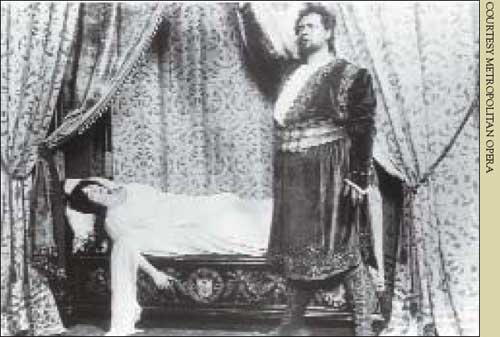Vital Signs:
Living (and dying) operatically
Death in the real world and death on the operatic stage "are very similar," according to music historian Peter Fox Smith. Smith, longtime host of Vermont Public Radio's Saturday Afternoon at the Opera, presented a talk titled "Dying Operatically: Nell'Ora della Morte (The Hour of Death)" as part of a DHMCsponsored series of reflections on mortality.

|
| Otello mourns the death of Desdemona in this scene from a Metropolitan Opera production of Verdi's Otello dating back to about 1910. |
Using video and audio clips from seven operas, Smith offered his own insight on ways in which death scenes in opera are relevant to both daily life and the end of life. One excerpt he played was from Francis Poulenc's The Dialogs of the Carmelites, about the political murder of Carmelite nuns during the French Revolution. In a surreal scene, soldiers lead the nuns, one by one, down a long pathway into the darkness-and the guillotine-over magnificent music. "Numerous deaths occur from political turmoil and from revolutionary activity in the daily newspapers and on our television sets," explained Smith, "and this [scene] is an extraordinary example."
He asserted that listening to opera can help people see beauty in their lives, especially at the end of life. He gave an example of a colleague who worked with patients dying of AIDS. "He introduced them to this magnificent prayer sung by Tiana Lemnitz [as Desdemona], the 'Ave Maria' from Verdi's Otello, including the line 'in the moment of our death.' Her pianissimo," said Smith, "is like no other soprano I've ever heard."
Smith also described a friend of his who had a brain tumor and was in a coma for several weeks before his death. On the day he died, his wife was straightening up his room while Wagner's Tannhauser was playing in the background. "In his very last hours," said Smith, "he opened his eyes, watched his wife, followed her going around the room, and went to the great beyond. He died operatically."
M.C.W
If you would like to offer any feedback about this article, we would welcome getting your comments at DartMed@Dartmouth.edu.
